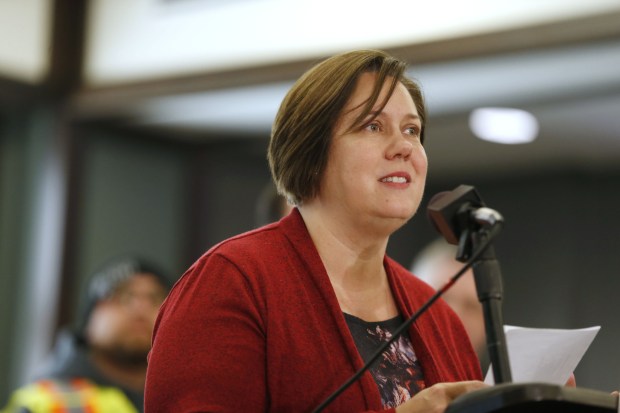A provision of Illinois’ 2021 Climate and Equitable Jobs Act (CEJA) designed to provide relief to Zion taxpayers now has the intended beneficiaries fighting for what they believe is their fair share of about $330 million in environmental compensation over the next 22 years.
State Rep. Joyce Mason, D-Gurnee, who crafted the part of the law affecting Zion, said figuring out how to compensate those who sustained economic losses after the Zion Nuclear Power Station closed in 1998, leaving the fuel rods buried there, was complicated.
A purpose of the CEJA was helping towns like Zion which are environmental justice communities. Mason said since most of the impacted places were hurt because of closed coal plants, some creativity was needed for a municipality which lost a nuclear facility.
Mason, Zion Mayor Billy McKinney and representatives of the other taxing bodies impacting Zion, developed a solution nearly three years ago which came apart on May 28 over a disagreement between the city and Zion-Benton Township High School District 126.
When the CEJA was signed into law by Gov. J.B. Pritzker in September of 2021, the legislation had a part allowing Zion to receive a grant from the Illinois Department of Commerce and Economic Opportunity (DCEO) of almost $15 million annually for 23 years.
Working with the DCEO, Mason sought clarification on the grant application since six taxing bodies — Zion, District 126, Zion Elementary School District 6, the Zion Park District, the Zion-Benton Public Library and Zion Township — were involved.
“Since the grant was for Zion and there were six taxing bodies involved, we asked DCEO if Zion should apply alone,” she said. “They said each taxing body should apply. As long it was normal use, it would not be a problem.”
McKinney formed a leadership group with representatives of each taxing entity to devise a plan. There was a consensus — with the exception of District 6 — to use the money to abate property taxes for Zion residents and businesses.
“They said they would go along with the abatement,” the mayor said. “This money is for economic development. Lower taxes will attract businesses, and bring back the jobs we lost when the plant closed. We counted on everybody to do the right thing.”
David Knabel, Zion’s city administrator, said the group agreed, with the exception of District 6, that the two school districts would each get 15%, the city would receive 60%, the Park District 6%, the library 2% and the township 2%. The proposal went to the DCEO in mid-May.
“DECO said, ‘We want the signatures of the rest of the group,’” Knabel said.
Mason said all parties except District 6 were in agreement. Since the leadership group started to meet in 2021, District 6 Superintendent Keeley Roberts resigned in May of 2023. Two interim superintendents are now in charge.
The District 126 Board of Education approved a resolution on May 28 opposing the plan, claiming it should receive a proportional share — which should be 27% — and the city should get 16%, according to the language of the resolution.
Working with McKinney and others to develop the revenue-sharing plan, Mason said she was disappointed District 126 took the action it did. She said district officials “went back on their promise,” and didn’t tell the board about the agreement.
“We sadly, foolishly now regret we trusted everybody to do what we agreed to do,” she said. “Now we have folks trying to keep all they can. What good does it do to build new buildings if people are losing their homes or can’t afford groceries?”
Lynette Zimmer, the co-interim superintendent of District 6, said the seven schools within the district average 71 years in age. At a meeting last year, more than 100 residents were asked how the CEJA money should be spent. They preferred improved buildings to lower taxes, she said.
“This aging infrastructure does not provide our children with the learning opportunities that they deserve,” Zimmer said. “Our community expects and trusts us to do the right thing for our schools and for our children.”
Though Zimmer said it will take hundreds of millions of dollars to properly renovate the seven schools, the district has a history of abating taxes since 2010, totaling $19.5 million. That includes more than $3.9 million last year, and $2.8 million the year before.
District 126 Superintendent Jesse Rodriguez said taxes are being abated there too, including $1.8 million last year, $3.7 million the year before, and $6.8 million total the three years prior. Since the two school districts represent 77% of property taxes paid, he said they deserve the largest share. The elementary and middle schools’ needs are acute, he added.
“This is taking money away from education,” Rodriguez said. “I told my board District 6 has (so many) needs, we owe it to help District 6. We will not agree with anything that will take away from District 6. We need to grow our schools.”

McKinney said the foundation of the environmental justice grant is economic development. It will raise the tax base as businesses arrive and grow so all the entities will receive more revenue, he said.
“The whole premise was to abate property taxes,” McKinney said. “As a courtesy, we included the other taxing bodies because we believed they would do the right thing about property taxes.”





